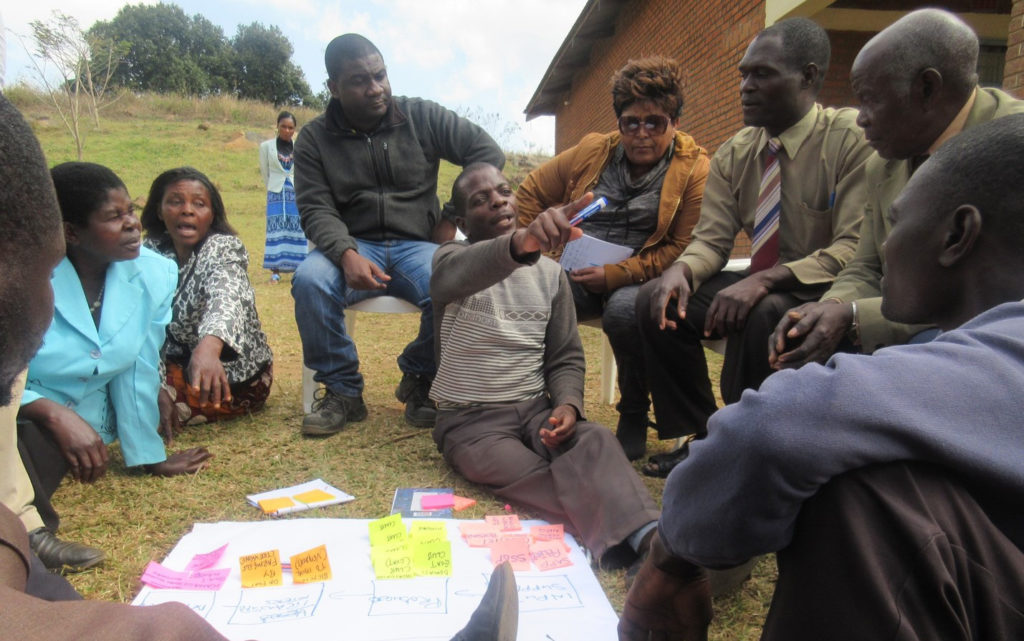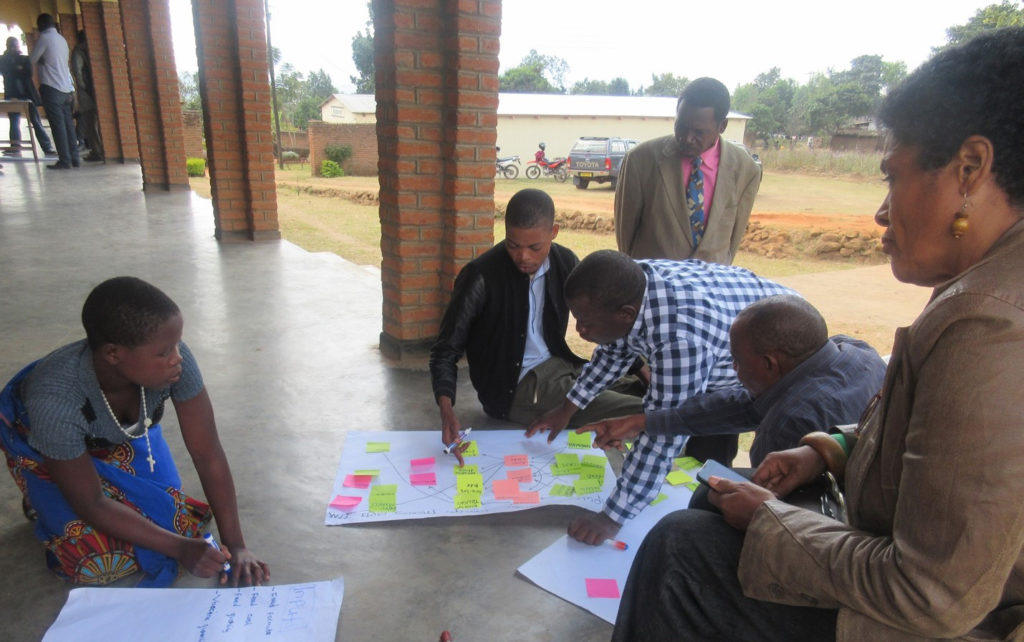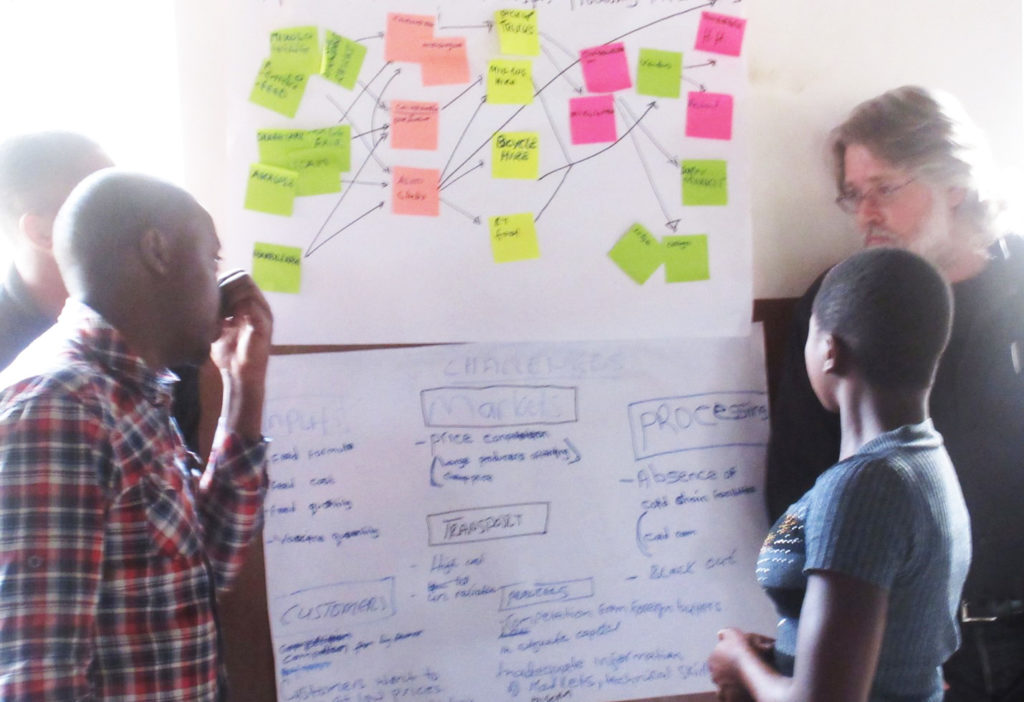
Discussing value chain solutions
Agriculture is about people. People talk all the time, but not always about the right stuff! The most effective way to find solutions to the challenges of farming, is to get people talking – about agriculture, and the solutions, rather than only the challenges.
At the heart of agricultural development is changing people’s behavior. In rural Malawi, agriculture has traditionally been founded on strong beliefs. “We must all work harder” is the common answer to what needs to be done. Furthermore, most interventions are age-old linear approaches, being slow and often ineffective. No one dances when the music is no good!
But, they ask, what are the alternatives?
In three districts in southern Malawi a new drum is beating. Its sound: Innovation Platforms (IPs).
The improved livelihoods through sustainable intensification and diversification of market oriented crop livestock systems (CLIM2 Project) aims to trigger a self-perpetuating process of innovation, investment and adaptation in agriculture. Through IPs, farmers learn the new beat; the tones are about diversification and integration, inputs, markets, knowledge and new skills and opportunities. At the same time, the IP creates a conducive environment where farmers can gain capacity, their group performance improves and small- and medium-scale enterprises are strengthened by becoming more relevant. Ultimately, overall harmony should improve with increased incomes and livelihoods of the most marginalized in society – smallholder farmers, rural poor, youth and women farmers – through affordable plant- and animal-based food and fuel production. The IP brings a big shift from the linear way of development work, towards orchestrating deeper changes. The IP is holistic and inclusive in its approach to realizing opportunities, and solving problems and challenges, and therefore brings a diverse range of actors together.
Facilitation is critical for the IP process, much like a conductor’s role in coordinating the orchestra, bringing structure and rhythm to the music.
The CLIM2 project aims to see a gradual shift from strong facilitation by the project team at the initial stage, to more active and confident engagement by the IP members in managing their own affairs. The gradual takeover of the management by IP members should help them in guiding actions, and strengthening roles and relations among themselves. The CLIM2 team therefore consists of researchers and development actors from different disciplines who start working in partnership with the government of Malawi, each organization bringing its specialist background and contributing specific skills and knowledge to the project. From the beginning, the team fosters mutual understanding of challenges, aspirations and expectations, and guides the roles and relations the IP members can play for achieving their common goals. The team carefully guides the IP to create its own music.

Drawing up value chains
The IP includes farmer groups, associations and cooperatives; private sector actors such as Agriculture Trading Company (ATC); financial service providers such as FINCA and COMSIP; livestock buyers; food processors; retailers like Shoprite; government extension staff; and NGO networks. This represents a huge diversity in knowledge and local experience; knowledge of different actors constitute the instruments that make the band. With sound information, own experimentation and knowledge exchange, IP members determine the direction, content and process that the IP takes. The diversity among its members makes the music richer. Farmers, agriculture input-output market actors and support service providers talk to one another and develop their relationships into a harmonious tune.
The main goal of this process is for smallholder farming systems to improve on efficiency from the farm to the market, while private sector reduces transaction costs and explores new markets with farmers. The project uses IPs to facilitate and increase dialog for synchronizing the sounds among different players in the agricultural value chains.
IPs improve the way members interact, structuring and guiding conversations, to move forward from discussing problems only to developing common solutions. The musicians are finding their beat using well selected methods and tools. An IP process typically starts with a series of structured exercises, joint problem identification, envisioning a better future, value chain prioritization, mapping and characterization, charting courses of action between meetings, and documenting process lessons, which altogether build the IP members’ capacity and empower them in the process.
Numerous problems and associated solutions have been identified through IPs thus far. The catch is that actors understand that all their problems are linked. If markets do not work, then farmers cannot invest in their farming, input suppliers cannot sell, buyers let down consumers and support service providers feel pointless. The music is off-key. One farmer in the Balaka IP said, “We are getting a chance to directly talk to those that have an influence on our farming and that is priceless”. The problems were clustered around input-output markets, support services, unprofitable enterprises, quantity and quality of yields/outputs and decision-making by actors. As a result, the IP in Balaka district was able to prioritize the goat value chain for its high development potential and earmarked the butchers at Phalula EPA as instrumental for addressing the problems associated with goat marketing, infrastructure and pricing.
Through the IP, a shared vision was generated. Farmers want to increase their yields and improve their livelihoods; traders want to increase their profits and business volumes while support services want to see changes in their working conditions. All this glued together by the realization that all these hopes are highly dependent on actions of other actors. There is a salient symmetry in this new music. Trust is another commodity that seems elusive. How can we increase the level of trust in ourselves and our outputs? We have to be able to provide quality outputs in the right quantity and at the right time to earn deserving prices. The IPs have initiated this conversation. Mr Koloko, a butcher from Balaka, tells a desperate farmer that he can pay him more for his goat only if the quality of the goat is good. The farmer looks at him in disbelief, wondering why he is not getting a good price for his goat and what the butcher means by ‘good’. That is what the IP is giving its actors – a crack at information, a critical ingredient if rural agricultural markets are to work. Everyone can hear the sound.

A young representative explaining challenges in local chicken value chains
“If markets do not work, then farmers cannot produce enough quality products for the markets, as they cannot buy inputs to produce enough for themselves and the markets,” states Andre Van Rooyen (Project Team Leader). Immense opportunities to develop small- and medium-scale businesses around markets comes together with this profound reality. The analysis of gross margins for various commodities show high costs of inputs, transport, bulking and processing as being major reasons for the inability of farmers to realize benefits from their production. It is important to bring the input and output market actors closer to the producers. If the goals of the IPs are to be met, then we need markets; markets that are efficient and profitable. Producers are aware of the crops and livestock that they can produce at profit although their potential has been highly understated. However, a lot of work needs to be done so that IPs can spur effective and efficient flows for information, products and incomes – the three factors critical to realizing profitable markets. Capacity gaps of actors in the platform and outside need to be identified and addressed. The policy environment also needs a serious push. These two issues constitute the Siamese twins of smallholder agriculture today.
Like members of an orchestra playing different instruments, IP members represent different actors with different contributions to the value chain – but with the right conductor and a common score sheet, their efforts can be harmonized into song and moving to a new beat; sustainable intensification of agriculture production and marketing systems. In the CLIM2 project the IP beat is spreading from district to district. Like a band tuning up, at first the sound can be discordant, but with the help of the right tools to understand individual requirements and map the way forward in IPs, the project is creating an audible melody. For the first time, actors are planning together how to address numerous challenges in agriculture. The journey has just started but expectations and hopes are high as evident in the visions of actors. The initial IP meetings provide a clear direction as to how the CLIM2 project is likely to intervene with lasting impacts through building capacity of platform members, development of markets for the selected value chains, increasing on-farm or near-farm value addition, increasing participation of youth and women in market-led agriculture and the development of small and medium enterprises.
We will keep working on this, until everyone hums the same agricultural tune in shops and fields while processing and transporting and selling produce, all the way to the bank.
An agricultural symphony, harmonized.
About the author:

Kalima Sunday
Acknowledgements
Blog-writing training and editing by Violette Kee Tui.
CRP: 


Add Comment